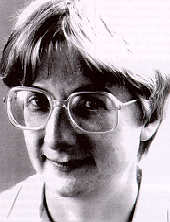
Sarah Ellis
Profile
Feature by John Burns.
Reprinted from Children's Book News a publication of the Canadian Children's Book Centre.
I FIRST MEET SARAH ELLIS in the gloaming, that twilight time between day and night when magical things can happen. It is mid-November, the season of stories around the hearth and departed spirits just out of sight. As she sips from her hot-chocolate-hold-the-whipped-cream, she transforms our trendy cappuccino hideaway into a land far away. The Vancouver novelist-librarian-storyteller begins by outlining the impetus to Back of Beyond, her latest book: "I started to get very interested in what exactly would it be in a culture that would give rise to a woman with a wonderful husband and bonny children in a supportive community who one day goes off with the fairies. (Pause.) Doesn't this just sound like the dilemma of so many women here and now and always?"

Ellis crosses professional boundaries with ease. She has written children's books for a decade now and worked as a librarian for twice that. These roles "all kind of flow into each other" she says. "I find writing a book review or speech or something about children's literature easier, in a way, than writing fiction, because it's more logical. And since you usually get paid for this writing right away, it feels like work. Writing fiction feels very much like play to me."
Of her other role, she says, "Being a librarian is different. It's changing so radically, I feel pretty at sea about my role. All the values I really believe in - about the value of imagination, the value of concentrating on an idea privately and the value of nonmainstream ideas - are up for grabs at the moment."
To the suggestion that the role as gatekeeper of information still stands, Ellis laughs, "That's my idea, but I'm not sure that's what the public or the library board thinks. I feel that actually librarians always did that on the sly. Nobody ever went to their city council and said "You should fund libraries so that we can foment rebellious thought in the young. They went saying (good libraries would make) good citizens; but librarians being who they are ... that's what they did."
Rebellious thoughts abound in Back of Beyond, a collection of short stories set in the realm where mundane and magical worlds overlap. Ellis's protagonists have one foot in childhood and the other in adulthood; their transitional role means that anything can happen, and does. A sister prays to Mr. Potato Head that her brother will leave his cult and return home to her; he does but in a new guise. A boy spends a night in the company of an elusive girl who can read his mind, though they meet only by computer. A youngster's family opens its heart to a troubled child who receives love from an inexplicable source.
In Back of Beyond, worldly concerns function as counterpoint to the fairy tale elements that Ellis builds on. This mixture of modern content and traditional genre-defined structure (the once-upon-a-time formulas that underpin fairy tales are still present but muted) eased the task of writing: "I don't usually know what is going to happen. I actually hate plot, even as a reader. But with these stories, I really knew what was going to happen."
Ellis is quick to point out the debt she owes to traditional folklore. "I don't think anyone reading the stories is going to know," she cautions, "but they mostly come from the British tradition. I was just remaking them in contemporary terms."
Though few of the 12 stories mention creatures like pixies or selkies, strange occurrences intrude into the lives of all her characters. Ellis's epigraph clarifies this relationship, citing Barbara Rieti, author of Strange Terrain: The Fairy World in Newfoundland: "Most 'fairy' appearances are unspectacular, private affairs, unaccountable little slippages in space or time, oddities pondered from time to time by the people involved ... Iittle fairy tricks, and suddenly everyday reality is open to question."
Unlike Ellis's early works, these stories feature protagonists as old as 16. She enjoyed writing for a more sophisticated reader because "in the longer books, I'm pretty linear. Short stories seem to me to lend themselves to non-linear telling, to a set of images with a flashback. I play a little bit with tense. I think there's way more room for the reader to put it together. And (this form) seems to suggest things like politics and mortality, themes that don't seem like an ll-year old reader's themes."
Looking to the future, Ellis admits that she enjoyed shifting from novel to short story form and is considering another change in genre: "There's probably not much I would say I would never do. I think my next project will be nonfiction, but even as I say that, last night we had a power outage and I started to think of a story about a power outage ... They sneak up on me. I could do two books simultaneously. I've never done that. I might try it."
We head out into the twilight. In the gathering dusk, anything seems possible.
John Burns is a freelance writer in Vancouver